![]() Scientists from Peking University and Tsinghua University awarded with Bayer Endowed Chair, Bayer Investigator and Bayer Postdoc
Scientists from Peking University and Tsinghua University awarded with Bayer Endowed Chair, Bayer Investigator and Bayer Postdoc
![]() So far, nearly 200 Chinese scientists have won relevant awards and grants
So far, nearly 200 Chinese scientists have won relevant awards and grants
![]() Bayer and Tsinghua University established the Bayer Microfunding for the very first time to further strengthen translation of early innovation from scientific research.
Bayer and Tsinghua University established the Bayer Microfunding for the very first time to further strengthen translation of early innovation from scientific research.
Bayer, together with Peking University and Tsinghua University, recently unveiled the Bayer China Academic Collaboration Award 2022, including Bayer Endowed Chair, Bayer Investigator, Bayer Postdoc, as well as Bayer Microfunding[1]. Bayer China Academic Collaboration Award aims to honor distinguished scholars from prestigious Chinese universities and recognize their outstanding achievements in life sciences, medical science as well as drug research and development, to strengthen communication and coordination between the pharmaceutical industry and academia and to advance basic research applied to the research and development of new drugs, thus accelerating breakthrough innovations that will benefit patients.
This year, the scientists awarded the Bayer Endowed Chair are Professor Xuemei Chen, Chair Professor, School of Life Sciences, Peking University, andProfessor Songhai Shi, Dean, School of Life Sciences, Tsinghua University . Meanwhile, a total of 9 scientists from Peking University and Tsinghua University became Bayer Investigator through the selection of the Joint Steering Committee (JSC) composed of Bayer experts and senior scholars from the top two universities in China. In addition, three outstanding young researchers from Peking University grew into Bayer Postdoc.
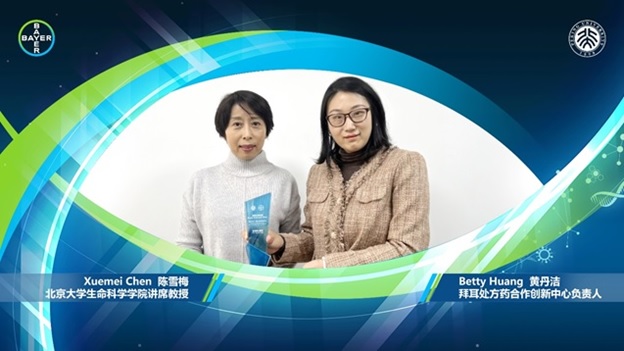
Figure1. Betty Huang, Head of Collaborate to Cure (CtC) Hub China, presented the "Bayer Chair Professor" award to Professor Chen Xuemei of Peking University
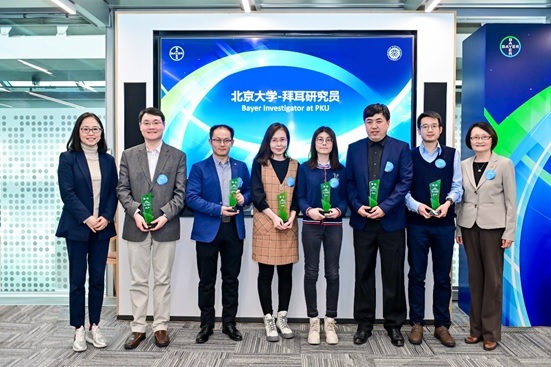
Figure 2. Professor Wu Hong from School of Life Sciences at Peking University and Zhang Hua, Site Head of R&D Beijing, Bayer Pharmaceuticals presented the “Bayer Investigator” to Peking University winners.
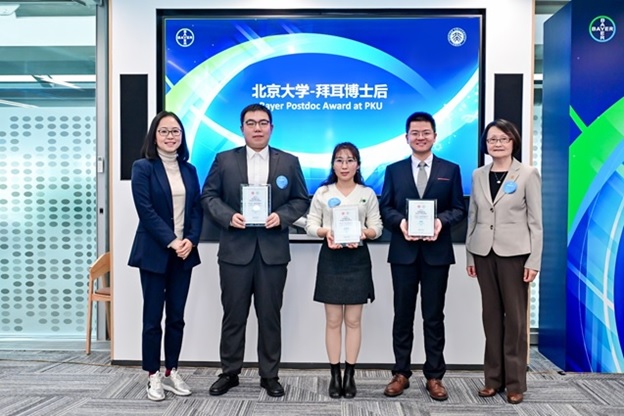
Figure 3. Professor Wu Hong from School of Life Sciences at Peking University and Zhang Hua, Site Head of R&D Beijing, Bayer Pharmaceuticals presented the “Bayer Postdoc” to Peking University awardees.
To further strengthen translation of early innovation in drug discovery and support scientific exploration driven by Chinese investigators, Bayer and Tsinghua launched the Bayer Microfunding last year. Professors Zhi John Lu and Xuerui Yang from the School of Life Sciences of Tsinghua, Professor Haidong Tang from the School of Pharmaceutical Sciences of the university became the first group of Chinese scientists to receive funding support from the Bayer Microfunding.
“I would like to extend my congratulations to all the winners of the awards. Thanks to your contributions that represent the innovative potential in China, the future of both health and care shines brightly,” said Dr. Friedemann Janus, Acting Head of Business Development & Licensing and Open Innovation, Bayer Pharmaceuticals, “We are proud to be the first multinational pharmaceutical company to establish collaborations with research institutes and universities in China.” Taking China as a key source of global innovation, he said that the team at Collaborate to Cure Hub China is dedicated to sourcing innovation in the local ecosystem to explore new ways to partner with universities, research institutes and biotech companies, for delivering breakthrough innovations for patients, today and in the future.
“I highly appreciate Bayer for its long-standing support over the past decade on talents and scientific research of life sciences and medicine from Tsinghua University and Peking University. The collaboration between Bayer and the two universities sets a benchmark of partnerships between multinational companies and universities, industry and academia, basic research and translation & application, talent introduction and development in the field of life sciences. Meanwhile, the collaboration between us has provided valuable experience. Through closer and more comprehensive collaboration, we will be able to further discover and develop new medical products effectively and solve the common healthcare challenges faced by all mankind,” said Hongwei Wang, Professor of School of Life Sciences and Vice President of Tsinghua University. He is a JSC member for Bayer Academic Collaborations in China and was the winner of Bayer Endowed Chair in 2018.
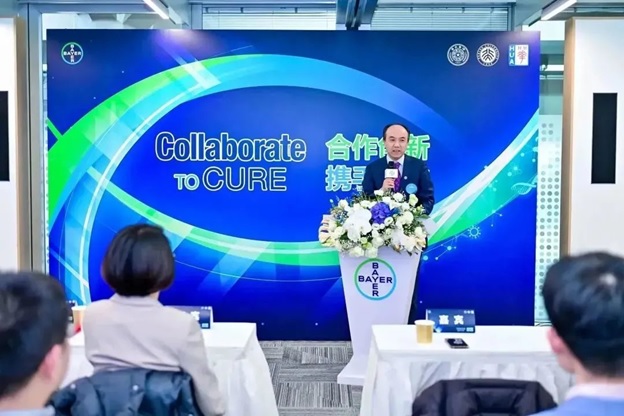
Figure 4. Professor Wang Hongwei from Tsinghua University delivered the speech.
“The strategic partnership between Peking University and Bayer has perfectly integrated Peking University's scientific expertise with Bayer's know-hows on drug research and development. The collaboration during the past eight years have yielded fruitful outcomes, including new scientific discoveries, and licensing opportunities of drug assets to the company founded by a professor from Peking University. Bayer also supports the development of biopharmaceutical post-doctors introduced to the university. I look forward to the continuous deepening of the partnership between the two parties, and jointly advance the development of the biopharma industry to benefit patients around the world,” said Hong Wu, Chair Professor of School of Life Sciences, Peking University and Senior Investigator of Peking-Tsinghua Center for Life Sciences. Hong has also served as a JSC member for Bayer Academic Collaborations in China over the past eight years.
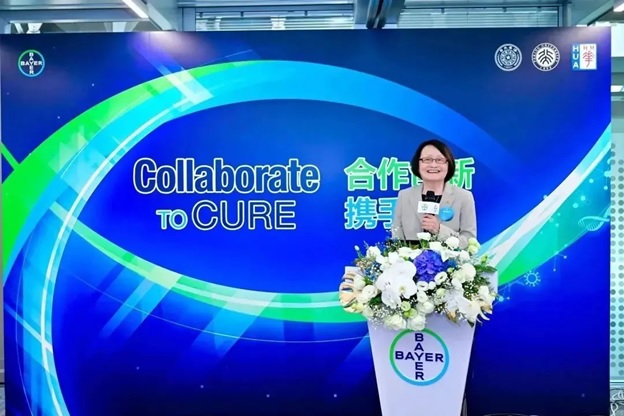
Figure 5. Professor Wu Hong from Peking University delivered the speech.
As of February 2023, nearly 200 Chinese professors, researchers and young scholars have won Bayer Endowed Chair, Bayer Investigator, and Bayer Postdoc awards.
About Bayer Academic Collaborations in China
Under the ambition of “Collaborate to Cure” for partnering, Bayer highly values and pays high attention on scientific research progresses and innovation originated from China. In addition to the Academic Collaboration Awards, the company established long-term strategic partnerships with local institutions Shanghai institute of Organic Chemistry, Tsinghua University and Peking University, aiming to complement Bayer's industrial know-hows with expertise of China’s research institutions in exploring cutting-edge innovation, thus accelerating translation of early research into new drug discovery for addressing unmet medical needs.
As of the end of 2022, Bayer and these three academic partners have carried out more than 110 research collaboration projects, including discovery and structural analysis of novel targets, pathogenesis and drug mechanism of action research, drug screening, efficacy evaluation as well as exploration on new modalities, new synthetic methods and innovative formulations, covering multiple therapeutic areas, such as, oncology, cardiovascular diseases, hematology and women’s health.
Appendix: Full list of the Bayer China Academic Partnership Award 2022 winners (in alphabetical order):Appendix.docx.pdf
[1] For the full list of the award winners, please see the appendix.